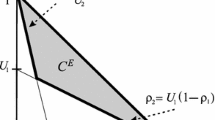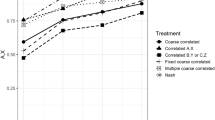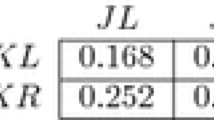Abstract
A correlated equilibrium in a two-person game is “good” if for everyNash equilibrium there is a player who prefers the correlated equilibrium to theNash equilibrium. If a game is “best-response equivalent” to a two-person zero-sum game, then it has no good correlated equilibria. But games which are “almost strictly competitive” or “order equivalent” to a two-person zero-sum game may have good correlated equilibria.
Similar content being viewed by others
References
Aumann, R.: Almost Strictly Competitive Games, SIAM, Vol. 9, No. 4, pp. 544–550, December 1961.
—: Subjectivity and Correlation in Randomized Strategies, Journal of Mathematical Economics, Vol. 1, pp. 67–96, 1974.
Harsanyi, J.: A General Solution for Finite Noncooperative Games Based on Risk-Dominance, Paper 29 in: Annals of Mathematics Studies, Number 52, (Dresher, Shapley, andTucker, eds.), Princeton University Press, pp. 651–679, Princeton 1964.
Parthasarathy, T., andR. Raghavan: Some Topics in Two-Person Games, American Elsevier, Chapter 3, New York 1974.
Shapley, L.: Some Topics in Two-Person Games, Paper 1 in: Annals of Mathematics Studies, Number 52, (Dresher, Shapley, andTucker, eds.), Princeton University Press, pp. 1–28, Princeton 1964.
Author information
Authors and Affiliations
Rights and permissions
About this article
Cite this article
Rosenthal, R.W. Correlated equilibria in some classes of two-person games. Int J Game Theory 3, 119–128 (1974). https://doi.org/10.1007/BF01763252
Received:
Revised:
Issue Date:
DOI: https://doi.org/10.1007/BF01763252




